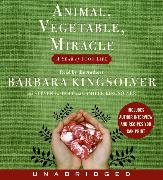Barbara Kingsolver was born in 1955 and grew up in rural Kentucky. She earned degrees in biology from DePauw University and the University of Arizona, and has worked as a freelance writer and author since 1985. At various times she has lived in England, France, and the Canary Islands, and has worked in Europe, Africa, Asia, Mexico, and South America. She spent two decades in Tucson, Arizona, before moving to southwestern Virginia where she currently resides.
Her books, in order of publication, are: The Bean Trees (1988), Homeland (1989), Holding the Line: Women in the Great Arizona Mine Strike (1989), Animal Dreams (1990), Another America (1992), Pigs in Heaven (1993), High Tide in Tucson (1995), The Poisonwood Bible (1998), Prodigal Summer (2000), Small Wonder (2002), Last Stand: America's Virgin Lands, with photographer Annie Griffiths (2002), Animal, Vegetable, Miracle: A Year of Food Life (2007), The Lacuna (2009), Flight Behavior (2012), Unsheltered (2018), How To Fly (In 10,000 Easy Lessons) (2020), Demon Copperhead (2022), and coauthored with Lily Kingsolver, Coyote's Wild Home (2023). She served as editor for Best American Short Stories 2001.
Kingsolver was named one the most important writers of the 20th Century by Writers Digest, and in 2023 won a Pulitzer Prize for her novel Demon Copperhead. In 2000 she received the National Humanities Medal, our country's highest honor for service through the arts. Her books have been translated into more than thirty languages and have been adopted into the core curriculum in high schools and colleges throughout the nation. Critical acclaim for her work includes multiple awards from the American Booksellers Association and the American Library Association, a James Beard award, two-time Oprah Book Club selection, and the national book award of South Africa, among others. She was awarded Britain's prestigious Women's Prize for Fiction (formerly the Orange Prize) for both Demon Copperhead and The Lacuna, making Kingsolver the first author in the history of the prize to win it twice. In 2011, Kingsolver was awarded the Dayton Literary Peace Prize for the body of her work. She is a member of the American Academy of Arts and Letters.
She has two daughters, Camille (born in 1987) and Lily (1996). She and her husband, Steven Hopp, live on a farm in southern Appalachia where they raise an extensive vegetable garden and Icelandic sheep.
Camille Kingsolver graduated from Duke University in 2009 and currently works in the mental health field. She is an active advocate for the local-food movement, doing public speaking for young adults of her own generation navigating food choices in a difficult economy. She lives in Asheville, N.C., and grows a vegetable garden in her front yard.
Steven L. Hopp was trained in life sciences and received his PhD from Indiana University. He has published papers in bioacoustics, ornithology, animal behavior and more recently in sustainable agriculture. He is the founder and director of the Meadowview Farmers Guild, a community development project that includes a local foods restaurant and general store that source their products locally. He teaches at Emory & Henry College in the Environmental Studies department. He coauthored Animal, Vegetable, Miracle with Barbara Kingsolver and Camille Kingsolver.
Barbara Kingsolver was born in 1955 and grew up in rural Kentucky. She earned degrees in biology from DePauw University and the University of Arizona, and has worked as a freelance writer and author since 1985. At various times she has lived in England, France, and the Canary Islands, and has worked in Europe, Africa, Asia, Mexico, and South America. She spent two decades in Tucson, Arizona, before moving to southwestern Virginia where she currently resides.
Her books, in order of publication, are: The Bean Trees (1988), Homeland (1989), Holding the Line: Women in the Great Arizona Mine Strike (1989), Animal Dreams (1990), Another America (1992), Pigs in Heaven (1993), High Tide in Tucson (1995), The Poisonwood Bible (1998), Prodigal Summer (2000), Small Wonder (2002), Last Stand: America's Virgin Lands, with photographer Annie Griffiths (2002), Animal, Vegetable, Miracle: A Year of Food Life (2007), The Lacuna (2009), Flight Behavior (2012), Unsheltered (2018), How To Fly (In 10,000 Easy Lessons) (2020), Demon Copperhead (2022), and coauthored with Lily Kingsolver, Coyote's Wild Home (2023). She served as editor for Best American Short Stories 2001.
Kingsolver was named one the most important writers of the 20th Century by Writers Digest, and in 2023 won a Pulitzer Prize for her novel Demon Copperhead. In 2000 she received the National Humanities Medal, our country's highest honor for service through the arts. Her books have been translated into more than thirty languages and have been adopted into the core curriculum in high schools and colleges throughout the nation. Critical acclaim for her work includes multiple awards from the American Booksellers Association and the American Library Association, a James Beard award, two-time Oprah Book Club selection, and the national book award of South Africa, among others. She was awarded Britain's prestigious Women's Prize for Fiction (formerly the Orange Prize) for both Demon Copperhead and The Lacuna, making Kingsolver the first author in the history of the prize to win it twice. In 2011, Kingsolver was awarded the Dayton Literary Peace Prize for the body of her work. She is a member of the American Academy of Arts and Letters.
She has two daughters, Camille (born in 1987) and Lily (1996). She and her husband, Steven Hopp, live on a farm in southern Appalachia where they raise an extensive vegetable garden and Icelandic sheep.
Camille Kingsolver graduated from Duke University in 2009 and currently works in the mental health field. She is an active advocate for the local-food movement, doing public speaking for young adults of her own generation navigating food choices in a difficult economy. She lives in Asheville, N.C., and grows a vegetable garden in her front yard.
Steven L. Hopp was trained in life sciences and received his PhD from Indiana University. He has published papers in bioacoustics, ornithology, animal behavior and more recently in sustainable agriculture. He is the founder and director of the Meadowview Farmers Guild, a community development project that includes a local foods restaurant and general store that source their products locally. He teaches at Emory & Henry College in the Environmental Studies department. He coauthored Animal, Vegetable, Miracle with Barbara Kingsolver and Camille Kingsolver.


